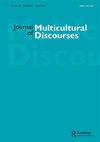Troubling circulating discourses on planet earth. Attending to complexities through a mobile-loitering gaze
IF 1.6
Q3 COMMUNICATION
引用次数: 1
Abstract
ABSTRACT This paper highlights the erasures of normal-languaging and normal-diversities that mark the contemporary human condition. Its aim is to make visible North-centric assumptions regarding the nature of language by asking what, when, why and where language exists and how it plays out in global-local, analogue-digital timespaces. In particular, the study presented in this paper troubles the interrelated ‘webs-of-understandings’ regarding language, identity and culture that are embedded in both traditional concepts and neologisms. It illuminates the looped taken-for-grantedness of established and emerging discourses in the Social Sciences and Humanities. Drawing attention to boundary-markings in scholars languaging that have become naturalized, the paper critically appraises how conceptual epistemic hegemonies continue to flourish across northern-southern places-spaces. It thus, also discusses the relevance of such questions in doing research itself. Inspired by an overarching reflection on various ‘turns’ (like the multilingual-, boundary – and mobility-turns), this paper calls for moving from North-centric knowledge regimes to engaging analytically with global-centric epistemologies where gazing from a mobile-loitering stance is key. This means that this paper poses uncomfortable and revised analytical–methodological questions that potentially destabilize existing global/universal understandings related to language, identity and culture.地球上流传的令人不安的话语。通过手机闲逛的目光来关注复杂性
摘要:本文强调了对正常语言的抹杀和标志着当代人类状况的正常多样性。其目的是通过询问语言存在的内容、时间、原因和地点,以及它在全球、本地、模拟数字时间空间中的表现,对语言的性质做出明显的以北方为中心的假设。特别是,本文提出的研究困扰着传统概念和新词中关于语言、身份和文化的相互关联的“理解网”。它阐明了社会科学和人文学科中既有话语和新兴话语的循环性。本文提请人们注意学者语言中已经归化的边界标记,批判性地评价了概念认识霸权是如何在南北方空间中继续蓬勃发展的。因此,它还讨论了这些问题在研究本身中的相关性。受对各种“转向”(如多语言转向、边界转向和流动转向)的总体反思的启发,本文呼吁从以北方为中心的知识体系转向分析以全球为中心的认识论,其中从流动游荡的立场凝视是关键。这意味着这篇论文提出了令人不安的、经过修订的分析方法论问题,这些问题可能会破坏与语言、身份和文化相关的现有全球/普遍理解。
本文章由计算机程序翻译,如有差异,请以英文原文为准。
求助全文
约1分钟内获得全文
求助全文

 求助内容:
求助内容: 应助结果提醒方式:
应助结果提醒方式:


